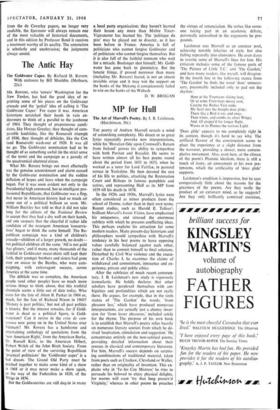The Antic Hay
Ma. ROVERE, who 'covers' Washington for the New Yorker, has had the good idea of re- printing some of his pieces on the Goldwater crusade and the 'genial' idea of calling it The Goldwater Caper.' For caper it was. American historians scratched their heads in vain en- deavours to think of a parallel to the jamboree of 1964. They thought of preposterous candi- dates, like Horace Greeley; they thought of com- parable landslides, like the Roosevelt triumph of 1936; they thought of debacles, like the Cox (and Roosevelt) wash-out of 1920. It was all no go. The Goldwater nomination had to be thought of as something awful (in the strict sense of the term) and the campaign as a parody of the quadrennial electoral circus.
What Mr. Rovere brings out most effectually was the genuine astonishment and alarm caused by the Goldwater nomination and the sudden deflation of hopes and fears when the campaign began. For it was soon evident not only to the Presidential high command, but to intelligent pro- fessional Republicans, that Goldwater was a flop, that never in American history had so much air come out of a political balloon so soon. Mr. William Buckley has told us that it did not take long for the editors of the National Review to accept that they had a dry well on their hands, and one suspects that the cheerful if rather idle candidate of the resurgent American 'conserva- tives' began to think the same himself. The Re- publican campaign was a kind of children's crusade—children of a larger growth, no doubt— but political children all the same. 'All is not gold that glisters,' and if many, many thousands of the faithful in Goldwater sweat-shirts still kept their faith, their younger brothers and sisters had gone over en masse to the Beatles, who were cam- paigning, with extravagant success, across America at the same time.
The debacle was so complete, the American people (and other people) have so much more serious things to think about, that this truthful chronicle seems a little out of date today. Who cares for the fate of Alton B. Parker in 1904 or, much, for the fate of Richard Nixon in 1960? `History is past politics,' but not all past politics is history. But the interest remains, for if Gold- water is dead as a political figure, is Gold- waterism? Can it revive in the crise de con- science now going on in the United States over Vietnam? Mr. Rovere has a handsome and entertaining anthology of quotations from the new American Right,' from the American Burke, Dr. Russell Kirk, to the American Hebert, Robert Welch of the John Birch Society. From the point of view of the surviving Republican 'Practical politicians' the 'Goldwater caper' is a bad dream. The Grand Old Party must be Patched together to make some kind of a show in 1968 or it may never make a show again, go the way of the Federalists in 1820, of the Whigs in 1856.
But the Goldwaterites are still dug-in in many
a local party organisation; they haven't learned their lesson any more than Maitre Tixier- Vignancour has learned his. The 'politique du pire' may be played out to disaster, as it has been before in France. America is full of politicians who cannot forgive Goldwater and of politicians who cannot forgive themselves. But it is also full of the faithful remnant who wait for a miracle. Boulanger shot himself; Mr. Gold- water has gone back to gimmickry. But the lunatic fringe, if proved narrower than many (including Mr. Rovere) feared, is not an almost invisible stripe and it may win the support on the banks of the Mekong it conspicuously failed to win on the banks of the Wabash.
D. W. BROGAN


































 Previous page
Previous page